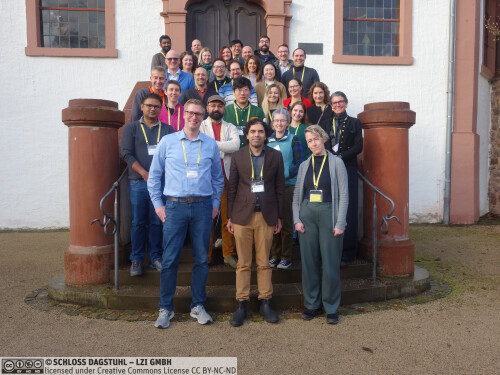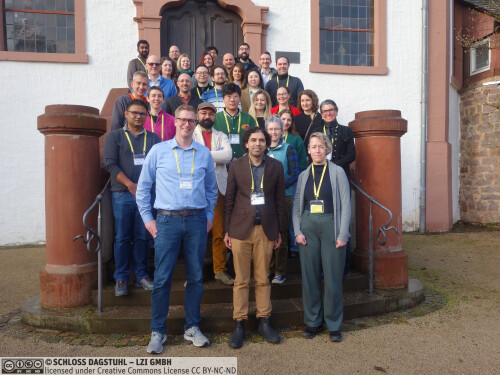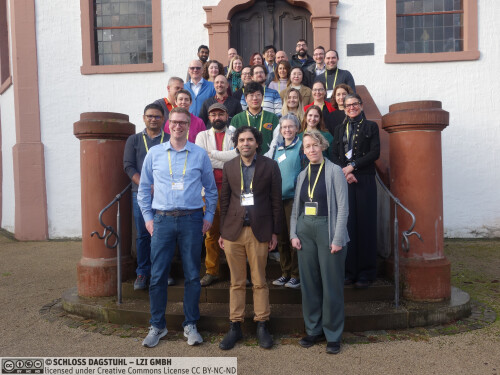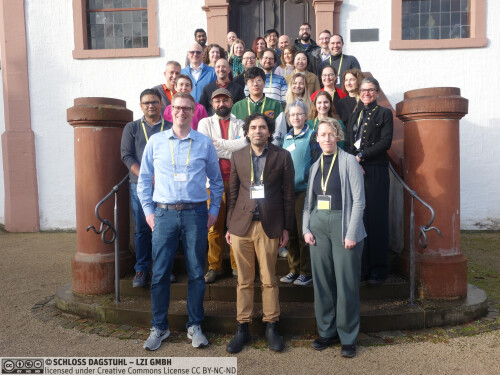Dagstuhl-Seminar 25021
Grand Challenges for Research on Privacy Documents
( 05. Jan – 10. Jan, 2025 )
Permalink
Organisatoren
- Florian Schaub (University of Michigan - Ann Arbor, US)
- Christine Utz (Radboud University Nijmegen, NL)
- Shomir Wilson (Pennsylvania State University - University Park, US)
Kontakt
- Andreas Dolzmann (für wissenschaftliche Fragen)
- Jutka Gasiorowski (für administrative Fragen)
Gemeinsame Dokumente
- Dagstuhl Materials Page (Use personal credentials as created in DOOR to log in)
Programm
- Dr. Kami Vaniea attends exclusive Dagstuhl Seminar on Privacy Research - University Of Waterloo Electrical and Computer Engineering News, January 14, 2025
The five-day Dagstuhl Seminar "Grand Challenges for Research on Privacy Documents" gathered an interdisciplinary group of researchers from privacy, natural language processing, human-computer interaction, public policy, and law to identify and characterize key challenges to research on privacy documents, such as privacy policies, terms of use, cookie policies, and other texts about data practices. In the status quo, privacy documents primarily serve the compliance needs of companies, while failing to fulfill the needs of other stakeholders in our information society. Although many Internet users have concerns about their privacy, most lack the time, knowledge, and other resources to understand these documents, leaving them underinformed and compromising the goals of the notice and choice paradigm. The needs of other stakeholders, including regulators, researchers, policymakers, and privacy practitioners, are similarly stymied. Although a growing body of research is devoted to analyzing, reconstituting, or otherwise using these documents to satisfy stakeholders' needs, broader interdisciplinary efforts are needed.
The goal of this seminar was to identify and characterize key challenges in privacy document research and to produce a research roadmap of how to tackle them in order to move the field forward. At a high level, the seminar schedule was structured into two stages to produce those outcomes. The first stage consisted of a series of perspectives talks providing background and introductions to relevant disciplines and approaches, as well as thematic panel discussions among participants. In the second stage, participants organized in topical working groups to more deeply explore specific areas and develop elements of the roadmap. Working groups focused on the following themes: (1) document formats and standardization; (2) datasets, automation, and analysis methods; (3) usable and useful notice and consent; (4)~consumer privacy beyond notice and choice; and (5) cross-stakeholder engagement.
The full report collects abstracts of the three perspective talks and presents research challenges and directions identified in the working groups. Each section describes respective challenges, key research questions, and solution ideas and directions. We present the full report to the research community as a resource for discussion and inspiration for future work.
 Florian Schaub, Christine Utz, and Shomir Wilson
Florian Schaub, Christine Utz, and Shomir Wilson
Dagstuhl Seminar will gather an interdisciplinary group of researchers from privacy, natural language processing, human-computer interaction, public policy, and law to identify and characterize key challenges to research on privacy documents: privacy policies, terms of use, cookie policies, and other texts about data practices. In the status quo, privacy documents fail to fulfill the needs of stakeholders in our information society. Although many Internet users have concerns about their privacy, most lack the time, knowledge, and other resources to understand these documents, leaving them underinformed and compromising notice and choice. The needs of other stakeholders, including researchers, policymakers, and privacy practitioners, are similarly stymied. Although a growing body of research is devoted to analyzing, reconstituting, or otherwise using these documents to satisfy stakeholders’ needs, broader interdisciplinary efforts are needed.
This seminar will identify and characterize key challenges in privacy document research and produce a roadmap of how to tackle them in order to move the field forward. The unique gathering of researchers will be an opportunity to develop and explore the challenges interactively in a highly connected interdisciplinary setting. Potential areas of challenges include:
Privacy document selection: Deciding what privacy documents to analyze is itself a complex question. Popularity, ease of collection, sectoral focus, language, and quantity of documents are factors with impacts that are only partially understood. Additionally, duplicated effort has led to siloed knowledge about best practices.
Privacy document retrieval: Privacy documents are typically collected from the Web or from app stores. Collection methods tend to be purpose-driven and organic, in response to basic collection difficulties (e.g., lack of rigid standards for where to post a privacy policy and how to parse its text) and to specific project goals. This represents a space of options that researchers to date have explored only in an ad hoc fashion.
Policy analysis: Methods vary widely from hand-labeling of small quantities of documents to text classification using large language models. Annotation schemes similarly vary in granularity from binary labeling of documents to frame-centric annotation schemes for labeling phrases or sentences. While no one set of methods accommodates all research goals, the hidden work of language resource construction for this domain is often underappreciated, and prior work remains underutilized.
Lack of a dedicated research community or publication outlets: Privacy policy analysis draws from a variety of different research areas that have had limited contact. While interdisciplinary research is widely acknowledged to be important, obstacles remain for computational researchers and law or public policy researchers to form effective research partnerships. Also, the outputs of interdisciplinary projects that focus on privacy documents may lack a venue that recognizes their value.
Availability and maintenance of research tools: The lack of community poses a challenge to discovering existing work on the analysis of privacy documents. Additionally, the lack of a way to discover tools for working with privacy documents is one of several contributing factors to lack of maintenance of them, as perceived utility is diminished.
By bringing together researchers who face these problems, the seminar will serve as a conduit for interdisciplinary discovery of shared goals and possible solutions.
 Florian Schaub, Christine Utz, and Shomir Wilson
Florian Schaub, Christine Utz, and Shomir Wilson
Please log in to DOOR to see more details.
- Noah Apthorpe (Colgate University - Hamilton, US) [dblp]
- Eleanor Birrell (Pomona College - Claremont, US)
- Travis Breaux (Carnegie Mellon University - Pittsburgh, US) [dblp]
- Kai-Wei Chang (UCLA, US) [dblp]
- Jose M. del Alamo (Polytechnic University of Madrid, ES)
- Rinku Dewri (University of Denver, US) [dblp]
- Nico Ebert (ZHAW - Winterthur, CH) [dblp]
- Simone Fischer-Hübner (Karlstad University, SE) [dblp]
- Sepideh Ghanavati (University of Maine, US) [dblp]
- Henry Hosseini (Universität Münster, DE & Westfälische Hochschule - Gelsenkirchen, DE) [dblp]
- Soheil Human (Wirtschaftsuniversität Wien, AT)
- Agnieszka Kitkowska (Jönköping University, SE) [dblp]
- Konrad Kollnig (Maastricht University, NL) [dblp]
- Kirsten Martin (University of Notre Dame, US) [dblp]
- Jelena Mitrovic (Universität Passau, DE & Institute for Artificial Intelligence R&D of Serbia - Novi Sad, RS) [dblp]
- Rishab Nithyanand (University of Iowa - Iowa City, US) [dblp]
- Shidong Pan (Australian National University - Acton, AU)
- Sarah Radway (Harvard University - Allston, US)
- Tim Samples (University of Georgia, US)
- Florian Schaub (University of Michigan - Ann Arbor, US) [dblp]
- Yan Shvartzshnaider (York University - Toronto, CA) [dblp]
- Daniel Smullen (CableLabs - Louisville, US)
- Peter Story (Clark University - Worcester, US) [dblp]
- Emma Tosch (Northeastern University - Boston, US)
- Christine Utz (Radboud University Nijmegen, NL) [dblp]
- Kami Vaniea (University of Waterloo, CA)
- Isabel Wagner (Universität Basel, CH) [dblp]
- Shomir Wilson (Pennsylvania State University - University Park, US) [dblp]
- Maximiliane Windl (LMU München, DE) [dblp]
- Lu Xian (University of Michigan - Ann Arbor, US)
- Tianyang Zhao (Pennsylvania State University - University Park, US)
Klassifikation
- Computation and Language
- Computers and Society
- Human-Computer Interaction
Schlagworte
- Privacy
- Policy
- Law
- Text
- Usability






 Creative Commons BY 4.0
Creative Commons BY 4.0
